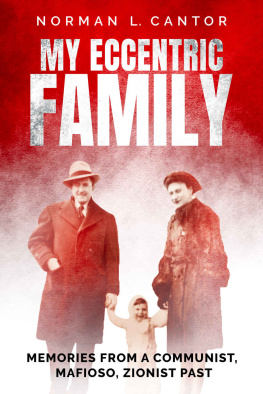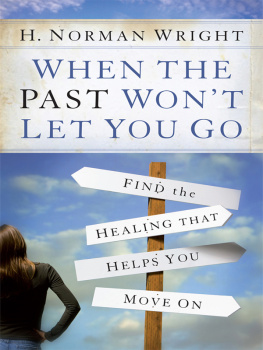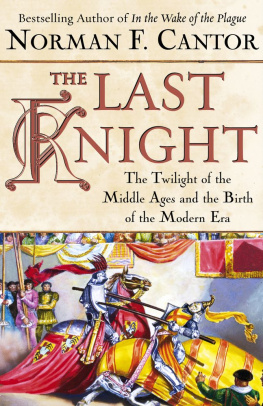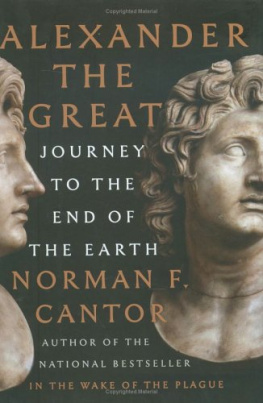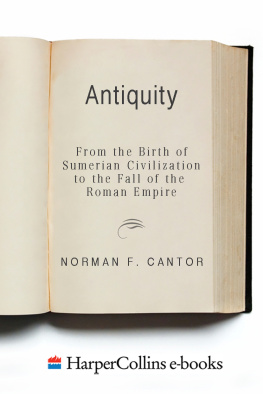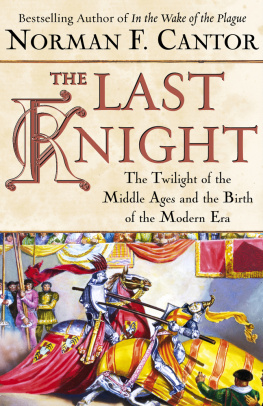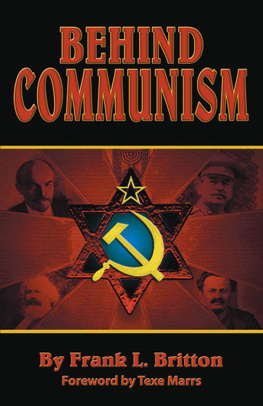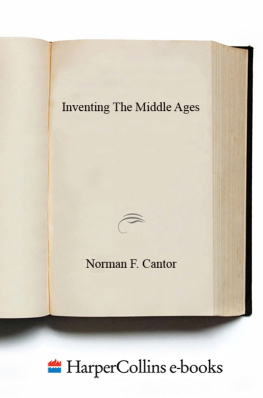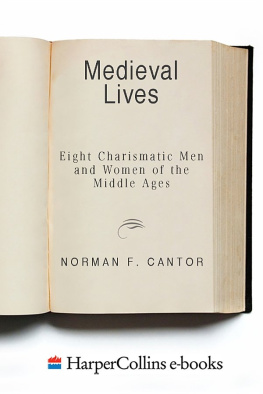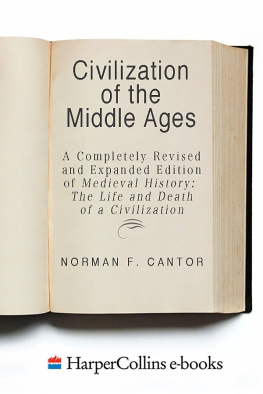Norman L. Cantor - My Eccentric Family: Memories from a Communist, Mafioso, Zionist Past
Here you can read online Norman L. Cantor - My Eccentric Family: Memories from a Communist, Mafioso, Zionist Past full text of the book (entire story) in english for free. Download pdf and epub, get meaning, cover and reviews about this ebook. year: 2020, genre: Non-fiction. Description of the work, (preface) as well as reviews are available. Best literature library LitArk.com created for fans of good reading and offers a wide selection of genres:
Romance novel
Science fiction
Adventure
Detective
Science
History
Home and family
Prose
Art
Politics
Computer
Non-fiction
Religion
Business
Children
Humor
Choose a favorite category and find really read worthwhile books. Enjoy immersion in the world of imagination, feel the emotions of the characters or learn something new for yourself, make an fascinating discovery.
- Book:My Eccentric Family: Memories from a Communist, Mafioso, Zionist Past
- Author:
- Genre:
- Year:2020
- Rating:5 / 5
- Favourites:Add to favourites
- Your mark:
- 100
- 1
- 2
- 3
- 4
- 5
My Eccentric Family: Memories from a Communist, Mafioso, Zionist Past: summary, description and annotation
We offer to read an annotation, description, summary or preface (depends on what the author of the book "My Eccentric Family: Memories from a Communist, Mafioso, Zionist Past" wrote himself). If you haven't found the necessary information about the book — write in the comments, we will try to find it.
Norman L. Cantor: author's other books
Who wrote My Eccentric Family: Memories from a Communist, Mafioso, Zionist Past? Find out the surname, the name of the author of the book and a list of all author's works by series.
My Eccentric Family: Memories from a Communist, Mafioso, Zionist Past — read online for free the complete book (whole text) full work
Below is the text of the book, divided by pages. System saving the place of the last page read, allows you to conveniently read the book "My Eccentric Family: Memories from a Communist, Mafioso, Zionist Past" online for free, without having to search again every time where you left off. Put a bookmark, and you can go to the page where you finished reading at any time.
Font size:
Interval:
Bookmark:

Producer & International Distributor
eBookPro Publishing
www.ebook-pro.com

My Eccentric Family
Norman L. Cantor
Copyright 2020 Norman L. Cantor
All rights reserved; No parts of this book may be reproduced or transmitted in any form or by any means, electronic or mechanical, including photocopying, recording, taping, or by any information retrieval system, without the permission, in writing, of the author.
Contact:
Contents
Introduction
I always thought that writing a memoir was pretentious and self-indulgent. I could make an exception for comedians, like Nora Ephron and Martin Short, whose life chronicles were quite humorous. But since I had no pretension of being a comic, no thought of a memoir crossed my mind. I was an experienced academic writer (4 books and scores of journal articles) but the notion of a memoir was anathema.
Then at age 76 a strange phenomenon occurred. I finally overcame a psychological block and read my Communist fathers 900 page FBI file. That reading triggered numerous recollections of my red diaper childhood. And when I casually recounted a few vignettes to friends and family, the universal reaction was wonderment and a strong curiosity to hear more about my upbringing.
Thanks to the timing of my birth (1943), my parents unusual circumstances, and my own later pursuits, I was an eyewitness or participant in some of the most noteworthy social and political movements of the twentieth century. My father, Manny Cantor, was for decades a central figure in the New Jersey branch of the Communist Party (hereinafter CP). His activities stretched at least from 1939 to 1957 a period when the Communist movement was vilified and pursued. That period encompassed the late 1940s and early 1950s when the McCarthy/HUAC pursuit of Communists reached its peak. While my personal recollections of that era were skimpy, the FBI filled in many gaps for me via its extensive surveillance of my fathers activities for over 15 years beginning in 1942. Hence the useful 900 page file.
My mother, Ruth Rabstein, was among the first women attorneys in New Jersey (graduating from law school in 1934) and became one of the most prominent female attorneys in the state. She was a pioneering member of the bar in several fields. She was an early participant in civil rights struggles of Blacks and workers. She developed an expertise in Workmens Compensation law that made her the States foremost practitioner in that field. And later in her career, she often represented women in high profile divorce proceedings. In short, my mothers legal career mirrored in significant measure the mid-twentieth century emergence of women as a force in the legal profession.
Through my parents occupations, then, I was witness (and vicarious participant) in two major 20 th century developments the abortive effort of Communism to alter the American political system and the successful effort of women to impact the legal system. On my own, I also managed to participate in two major social developments of the mid to late twentieth century.
My occupation was as a law teacher and scholar a 35 year career as a law professor mainly at Rutgers Law School with visiting appointments at several other law schools. By itself, an academic career is unremarkable, unworthy of memorialization in a memoir. Lots of people do a good job teaching Contracts, Constitutional Law, and Labor Law, as I did. Ho hum. What was distinctive in my case was my choice of scholarly focus starting in 1973 and extending to this day. By an odd confluence of happenstances (see Chapter III), I became a pioneer in the emerging field of death and dying jurisprudence. I became an early advocate of a right to death with dignity defined as the prerogative of a person stricken with a fatal affliction to shape the medical interventions determining that patients fate in accord with their personal vision of dignity. The formative days of the death with dignity movement are indeed worthy of memorialization.
The last movement touched upon in this memoir is the Zionist movement to reestablish a Jewish homeland after 2000 years of diaspora. While I was never a strong adherent to Jewish religious practice, a visit to Israel in 1976 as a tourist swept me away. I was amazed by the accomplishments of the Jewish states founders building a reasonably modern entity despite the burdens of several wars and the absorption of masses of ill-prepared immigrants. And I was inspired by the Israeli figures I met who were dedicated to the founders vision of a democratic state giving full recognition and rights to all its inhabitants regardless of religion. My introduction to Zionism and my modest efforts to advance that cause are worthy of memorialization.
That completes the 4 significant social movements underlying my presumption in undertaking a memoir. So how did Mafioso creep into the title? Well, I did have a brush with a genuine mafioso to be recounted herein. While that experience is not a major element in this memoir, it made for a piquant title. Memories from a Communist, Mafioso, Zionist Past is a far more provocative title than the more accurate Memories from a Communist, Women Lawyers Movement, Death and Dying Jurisprudence, and Zionist Past.

The Protagonists: Manny Cantor, Ruth Rabstein,
and their son Norman (c. 1945)
Chapter I
Red Diaper Baby
I was one of tens of thousands of Red Diaper Babies kids raised in the 1940s and 1950s by a parent or parents committed to the Communist cause. In the wake of the great depression of the early 1930s, most Americans embraced welfare capitalism as reflected in FDRs new deal legislation. The objective was to reign in capitalism by imposing workers protections, such as minimum wages, maximum hours, and wage deductions for social security funds. A small minority, like my father, Manny Cantor, sought a Marxist solution via centralized ownership and planning on behalf of the masses. They admired the Soviet model of Communism.
My father was atypical in publicly proclaiming his Communist convictions. He was the Communist Party (CP) candidate for public office in New Jersey at least 7 times -- once for governor, twice for the U.S Congress, twice for state senator, and twice for city council in Trenton. His sole occupation was as a functionary and organizer for the CP, appearing at innumerable gatherings seeking to promote his sacred cause.
Manny Cantors FBI file recounts the initiation of his protracted proselytizing efforts on behalf of the CP. While my father received a B.A. degree from Columbia University in 1930 and an LL.B degree from New Jersey Law School in 1933, he never showed the slightest interest in practicing law. At some point, he called lawyers parasites on society. During and after law school (until 1938) he was employed as a shipping clerk at a plumbing supply company in Passaic. Its clear, though, that his preoccupation with Communism had already begun. He became a member of the CP in 1934 and in 1938 was the CP candidate for Congress in his North Jersey district. In 1938, he became employed fulltime as CP organizer for Passaic County and in 1939 became the CP secretary and organizer for Mercer County. (My guess is that the transfer to Mercer County was motivated by a wish to be near my mother, Ruth Rabstein, the Trenton lawyer whom Manny married in 1941). His activity as Mercer County CP chair continued while he ran for state governor in 1940 and for Congress in 1942 on the CP ticket.
Font size:
Interval:
Bookmark:
Similar books «My Eccentric Family: Memories from a Communist, Mafioso, Zionist Past»
Look at similar books to My Eccentric Family: Memories from a Communist, Mafioso, Zionist Past. We have selected literature similar in name and meaning in the hope of providing readers with more options to find new, interesting, not yet read works.
Discussion, reviews of the book My Eccentric Family: Memories from a Communist, Mafioso, Zionist Past and just readers' own opinions. Leave your comments, write what you think about the work, its meaning or the main characters. Specify what exactly you liked and what you didn't like, and why you think so.

